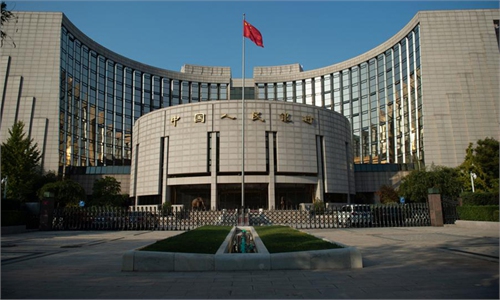More than 20 Chinese listed firms plan to access central bank's re-lending facility for share buybacks, shareholdings increases

A-share Photo: VCG
More than 20 Chinese companies listed in the A-share market have announced plans to tap into loans under a special central bank lending program for share buybacks and shareholdings increases, a trend that observers expect would be followed by more listed firms to reduce financing costs and inject more liquidity into the market.
The move, along with other tools rolled out by Chinese policymakers, would not only inject more dynamics into the stable and sound development of China's capital market but also greatly lift investors' confidence, analysts said.
Those listed companies are the first batch of enterprises that have secured loans for share purchases, after the People's Bank of China (PBC), the country's central bank, launched a special re-lending facility on Friday that aimed at guiding banks to provide loans to listed companies and their major shareholders for buybacks and increasing shareholdings. The program is set at a scale of 300 billion yuan ($42.18 billion) initially.
The first batch of companies covers a wide range of business areas, including energy, shipping, animal husbandry, photovoltaic systems and semiconductors, among others. The total amount of financing they access through the re-lending facility could exceed 10 billion yuan, according to a report by the Shanghai Observer.
For example, Sinopec announced that its controlling shareholder China Petrochemical Corp has signed a credit agreement with Bank of China to access a credit line of 700 million yuan, which will be used for the group to increase its shareholding.
China Merchants Shekou Industrial Zone Holding Co announced that China Merchants Bank's Shenzhen branch has plans to provide a loan limit of 702 million yuan to the group for equity buybacks. Among the other 20 or so companies that have joined the process include Cosco Shipping Holdings, Muyuan Foods and Linglong Tire.
Observers said that those companies will provide a demonstration effect to draw in more listed firms to participate in the program. They noted that the re-lending facility would offer enterprises access to low-cost financing to stabilize their share prices, while also sending a positive signal to the market on companies' development prospects.
"It will bring more liquidity into the capital market, therefore enhancing the market stability in the long term. Meanwhile, as companies and financial institutions purchase high-quality asset with 'real money,' it will boost investors' confidence," Yang Delong, chief economist at Shenzhen-based First Seafront Fund, told the Global Times on Monday.
The PBC also announced the official start of the operation of the securities, funds andinsurance companies swap facility on Friday, another policy tool to support the healthy and stable development of the capital market. China's top securities regulator has approved the applications of 20 non-banking institutions for the swap facility, with a quota of 200 billion yuan, or 40 percent of the initial scale of 500 billion yuan.
Tian Yun, a Beijing-based economist, said that the central government has sent a strong signal on unwavering support to ensure stable economic growth, which is also conducive for the long-term development of China's capital market.
On Monday, China's benchmark Shanghai Composite Index closed 0.2 percent higher at 3,268.11. The index has remained above 3,000 points since September 26.




